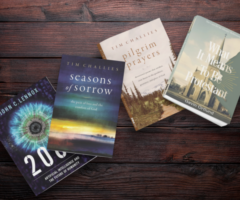
I recently wrote about Date Nights & Devotions or what the Lord has taught me about my relationship with him through dating my wife. In that brief article I simply sought to show that the purpose of our personal devotions does not need to be learning about God as much as just spending time with him. The great joy of personal devotions is not gaining facts about God but the joy of time spent together.
This leaves a question: How do we get to know someone better? How do we get to know God better? When pursuing God we tend to act differently than if we are pursuing another person. But I think we need to see that we should not break the rules of relationship just because we are attempting to relate to God.
Here are a few of the ways we relate to people which in turn point us to the ways in which we can relate to God.
We Spend Time
The way I came to know the woman who was to become my wife was by spending time with her. There was no trick to it and no shortcut. We sat in church services together, we went on dates together, we enjoyed one another’s company. We did this for 3 years before being married and we have continued to do so for almost 13 years since then. Any deep and healthy relationship will depend upon time spent together. This is true of human relationships and is certainly no less true when befriending God.
We spend time with God in personal devotions. Personal devotions need not be Bible study. They do not need to be a time where you depend upon commentaries and dictionaries, though these are wonderful resources. Personal devotions are simply a time to be with God, to enjoy communing with him. This is done by speaking and by listening, by saying words to God in prayer and receiving words from God through his Word. It may involve a long time of listening followed by a long time of speaking, or it may be far more conversational, far more back-and-forth. The purpose of it all is not to learn about God, but to know God, to grow in relationship with him.
We spend time with God in church. Jonathan Edwards was exactly right when he said, “The main benefit that is obtained by preaching is by impression made upon the mind in the time of it, and not by the effect that arises afterwards by a remembrance of what was delivered.” When we sit under the preaching of the Word we meet with God. We may not remember a whole lot afterwards, but that does not mean that we have not met with God. We can commune with God in prayer, in singing to him, in the Lord’s Supper. Free yourself to make each of these situations relational as much as intellectual (though I will grant that this is a bit of a false distinction).
We Tell Stories
I was once sitting with a friend—a friend I knew well—when he said, “There is something you need to know about me.” He proceeded to tell me a deeply personal, deeply moving story from his life. It’s a story he has told only a few people, a story he can only tell people who know him well. This story gave a deep glimpse into his life, opening my eyes to the kind of formative event that makes a man who he is. We grew closer to one another simply in the telling and in the hearing of the story. Stories have that kind of power to bring us closer together.
God tells stories. God is like any other proud father who loves to boast about his children. Have you listened to God tell a story recently? Have you heard him tell of his children, of the things he has done? God’s Word is a story of stories. Listen to it! Just this morning I listened to the story of Joseph revealing himself to his brothers (Genesis 45:4-8). It was great to hear this as God telling a stirring story as a proud Father.
We tell stories. In fact, we tell stories because God tells stories. I cannot imagine a relationship in which one person told all the stories. So tell a story to God. Tell him the story of how you came to know him; tell him the story of a great triumph or tell him about the most painful thing that has happened to you. He will listen. He will hear. Your relationship will grow.
We Ask Questions
Not too long ago we had some new friends into our home—people we had met recently and were trying to get to know better. They mentioned in passing that they had prepared for this visit by putting together a few questions that they wanted to ask us. They knew that these questions (and the answers) would be a deliberate means of building relationship. At the very least it would do more than discussing the sports or the weather. And so they asked their questions and we answered. And then we asked some questions in return. At the end of our time together we knew them better and they knew us better. Questions are powerful that way.
If you want to know God better, and if you want him to know you, you would do well to ask some questions.
Ask. When you hear from God through the Bible, pause to ask some questions. What does this say about who you are, God? What is true about you? What are you like? Why have you done these things? In what ways are you calling on me to change?
Answer. As you enjoy communication with God, you will need to answer questions as well. As he speaks to you, and as he hears from you, God asks you questions in return. How will you respond to what is true? How will you relate to me on the basis of what I’ve told you?
Try It
So why don’t we try putting this into action. Here is one way you can go about it:
Load your iPod with chapters 37 to 50 of Genesis or grab your Bible if you’d prefer to read than listen. It may be a good idea to find a translation of the Bible you are not quite so familiar with (lately I’ve been enjoying the HCSB). Find a place to be by yourself with God for at least 30 minutes, and have him tell you the story of Joseph (maybe in 1 sitting, maybe in a few). Joseph is not just some random individual the Lord happened to highlight in the Bible; rather, he is one of God’s children. So listen as you would listen to any friend tell the story of one of his children. Get to know God’s family—a sure means to get to know God.
As you listen, speak to God. Give feedback on the story. Interact with it. Marvel at Judah’s transformation; ask God why he would allow Joseph to torment his brothers by placing that cup in Benjamin’s sack of grain; tell God what you have learned of his character because of his constant goodness to Joseph; ask God to give you the stubborn hatred of sin that compelled Joseph to flee from Potiphar’s wife; ask why God wants to tell you this story; ask how it has shaped the greater story of what he is accomplishing in the world.
Take a few moments to answer the questions God is asking of you: How will you relate to me on the basis of the story he has told you? What do I reveal to be true about myself in this story?
And then tell God a story. Tell him something painful, something that hurts, something you would only tell a good friend—something you would have to tell a good friend if you were to enjoy true relational intimacy.
Just try it…










